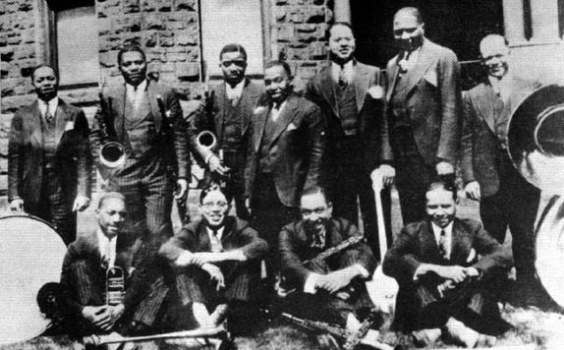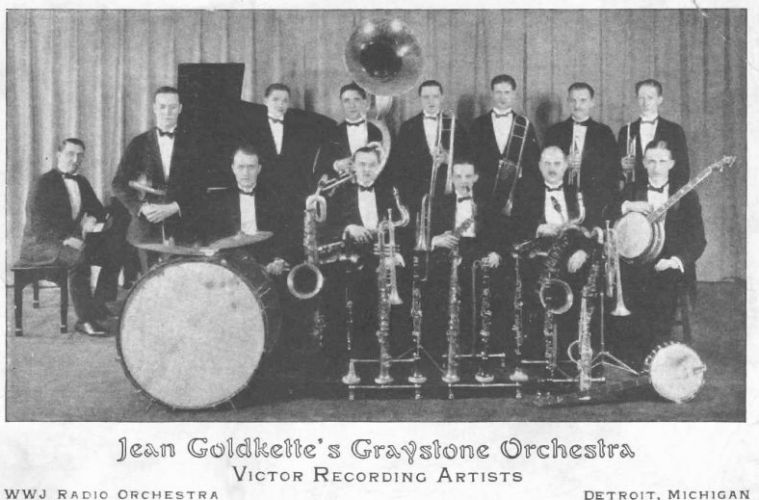Detroit is and has been the starting place for some of the greatest and most influential musicians in the world. You’ve heard about some of them. Your father (or Grandfather) may have made you listen to his SRC and Bob Seger records, or his Motown collection. Maybe, when telling you how crappy today’s music is, he tried to arouse your envy with stories of seeing The Stooges and the MC5 through an acidic, smoke-filled haze at the Grande Ballroom.
What your dear old dad (or Granddad) may or may not know is that Detroit has been kicking out the jams for close to a century. Your dad may have danced at the Grande Ballroom, but back in the 1920s, his grandparents may have slipped out of the house, grabbed a flask full of forbidden alcohol supplied by one of the local organized crime syndicates, and headed downtown to swing to the rhythms of some local Detroit heavies like McKinney’s Cotton Pickers and Jean Goldkette’s Orchestra at the Graystone Ballroom. Besides Granny and Gramps, The Graystone was regularly crammed with thousands – yes thousands – of Detroit’s other cool cats and kittens hoofing to the latest jazz beat.
If they were really rebellious, they may have found a secure spot in which to commune with Mary Jane before heading to their wild evening of jazz revelry. If young Granddad could ply young Grandma with enough illegal bourbon, perhaps they could stop on the way home from the jam-packed Graystone for something a bit more intimate, especially if Granddad was driving his parents’ Tin Lizzie. Chances are Grandma and Granddad ( Or Great Grandma and Great granddad) and were discrete in the stories they passed down so none of this would have entered into family lore.
Yes, it’s true. Before video games, comic books, and rock and roll drove the youth of America to illicit sex and juvenile delinquency, jazz was the corrupter of the young. It was new. It was dangerous. Parents didn’t understand.
In addition, Grandma and Grandpa may have been dancing to the music of black musicians. Like the minds and facilities of the nation, music was segregated. You had your black bands, and you had your white bands. Sometimes musicians surreptitiously crossed the color barrier. White guitarist, Eddie Lang, recorded some duets with black guitarist and blues singer, Lonnie Johnson. To avoid offending delicate sensibilities Lang took the pseudonym, Blind Willie Dunn.
Later, the barrier was crossed in plain sight and without apology. Benny Goodman, in the 1930s, hired pianist, Teddy Wilson, vibraphonist, Lionel Hampton, and guitarist, Charlie Christian. He played Fletcher Henderson’s arrangements.

McKinney’s Cotton Pickers circa, 1920s Detroit
Back in 1920s Detroit though, bands were strictly segregated. These days there are faint memories of McKinney’s Cotton Pickers, one of the great black bands of the day. They attracted great black musicians like Don Redman, Benny Carter, James P. Johnson, and others. There are even fainter memories of Jean Goldkette and his Orchestra, one of the great white bands of the day. They attracted great white musicians like Bix Beiderbecke, Joe Venuti, Eddie Lang, and others. Both bands, and around 20 others, were managed by Jean Goldkette, a white musician.
Goldkette’s Detroit bands, took the world by storm – well, not really the world, there were transportation issues in those days, but they did take the country by storm. They went head to head with the other great orchestras of the day and showed them all that Detroit could stand and play with the best of the east coast, west coast, Chicago coast, or any coast bands.
Goldkette’s name doesn’t come up too often, and I’d never heard of him until a friend at work gave me a bag of records that would otherwise have been thrown out. Among the five that weren’t crap was a 78 by Goldkette and his Orchestra.
I did some strenuous Internet research and learned that Goldkette was at the center of the 1920s Detroit music scene. I also learned that there are some discrepancies in Goldkette’s biography. He gave multiple, differing stories regarding his heritage and his birth date. We do know that he came from Europe in one of the early 20th century immigration waves, and he was a classically trained pianist. We also know that after the Detroit Jazz scene had temporarily faded, he left town to again play classical piano.
Why did he get into jazz? It could have been for the money. Or it could have been for the love of the music. Or it could have been both. Years later, Miles Davis would drop out of Julliard in order to play with Charlie Parker in NYC jazz clubs. Miles wasn’t a Detroiter, but he was Miles Davis.
Unlike Miles, Goldkette wasn’t a giant. But he worked with giants, he promoted giants, and he may have even created some giants. Today, we sit and listen politely to jazz in theaters or talk through sets in clubs while eating and drinking. In those days, jazz was dance music, baby. Grandma and Grandpa owed their wild nights out to Goldkette, who, in addition to managing the bands they danced to, was part owner of the Graystone Ballroom. The Graystone was the premier Detroit dance hall. It was the Grande, or the Bookies, or the St. Andrews, or the Clutch Cargo’s or the Fillmore of its day, but it was elegant and high-class. No jeans and t-shirts here. Grandma would have been all dolled up. Grandpa would be dressed to kill. They both would have been in full feather. Grandma though, may have had trouble from her parents if she was showing too much knee.
A young Berry Gordy danced at the Graystone. He would have done his dancing on Mondays, as Monday was “colored night.” Having not been born until 1930, he wouldn’t enter the Graystone until the 1940s (missing all of the cool bands), when the joint was again packing them in after a decline in attendance during the Great Depression forced Goldkette to sell the place.
How impressed was Gordy with the Graystone? He bought it in 1963. By then it had again hit on hard times, being used for boxing matches, roller skating, teen club dance parties, and the occasional big name performer. Gordy had dreams of returning the Graystone to its old glory. That never happened, but it’s been rumored that he made his mark on music in other ways.
Gordy gave the revival of the Graystone his best effort, hosting concerts by Smokey Robinson and the Miracles, Martha and the Vandellas, and 12-year old Stevie Wonder. Hard times continued and the building was finally torn down in 1980.
In its glory days of the 1920s and early 30s, the Graystone was regularly crowded beyond its 3,000-dancer capacity due not only to the Detroit bands, but also because the Graystone hosted Duke Ellington, Louis Armstrong, Fletcher Henderson, Cab Calloway, Earl Hines, Count Basie, and anybody who was anyone in the big-band world. Listeners around the country tuned in to radio broadcasts from the Graystone to hear these bands.
Of Goldkette’s bands, the two at the top were Jean Goldkette and his Orchestra (although Goldkette didn’t really play with them) and McKinney’s Cotton Pickers. Goldkette’s Orchestra came before the Cotton Pickers, their reigns only overlapping for a couple of years at the end of the 1920s. The Orchestra may have been able to continue longer than it did, had Goldkette’s best musicians not been hired away by the higher paying Paul Whiteman in 1927. There isn’t much information on Goldkette’s Orchestra. It seems they came, they played, they disappeared, but not before making some recordings (said to be inferior to their live performances), influencing other bands, and impressing critics and audiences.
While the out-of-town bands played Detroit, the Detroit bands toured the country knocking the socks off of listeners. In a 1931 poll by The Pittsburgh Courier, McKinney’s Cotton Pickers were voted the nation’s second most popular jazz dance band behind Duke Ellington’s Orchestra.
The Cotton Picker’s origins are in Ohio, but Ohio can be considered a Detroit suburb. They began as the Synco Trio in 1921 and adding members as they played all over the country, grew into the Synco Band over the next few years. Detroit became their home in 1926 with a five-month residency at the Arcadia Ballroom on Woodward Ave. From there they moved up Woodward to be the Graystone’s house band. At the behest of Goldkette, and to the chagrin of the musicians, they were renamed McKinney’s Cotton Pickers.
On the other hand, Goldkette had connections that were probably impossible for a black musician to create, so he was able to get the Cotton Pickers a recording contract. They ended up recording for RCA/Victor and then for Okeh as “The Chocolate Dandies.” Those recordings, including some with special guest, Lonnie Johnson, although little remembered today, were as good as any recordings of that time.
When the Depression hit, and it became harder for Detroiters to afford a night of drinking and dancing at the Graystone; like the Clampetts many years later, The Cotton Pickers headed west to California. There was a lot of travel and one-nighters along the way, which took a heavy toll on the musicians, causing the band to slowly disintegrate. Other musicians replaced the ones who left, but the band ultimately disbanded for good in 1934. McKinney occasionally resurrected the Cotton Pickers with guest musicians, but he finally left the music business in 1941.
Then, inspired by an interview with original Cotton Picker, Dave Wilborn in 1971, Detroit altoist David Hutson formed the New McKinney’s Cotton Pickers, playing music based on Don Redman’s original arrangements. They made three records.
The great thing about living in today’s Internet world is that McKinney’s and Goldkette’s recordings are easily available on CD, on vinyl, and on Youtube. We can no longer swing to these Detroit bands at the Graystone, but almost 90 years after their final performance, we can dance to them in our living room – assuming any of us can perform those ancient, formerly scandalous dances.
So the next time dear old Dad boasts of his misspent youth, remind him of Jean Goldkette and the fact that Detroit’s musical legacy goes back way further than he knew.
You want more info? Here is more, lots more:
http://heritage.umich.edu/stories/backstage-at-the-graystone/
https://www.encyclopedia.com/education/news-wires-white-papers-and-books/mckinneys-cotton-pickers
https://www.allmusic.com/artist/new-mckinneys-cotton-pickers-mn0001566815

